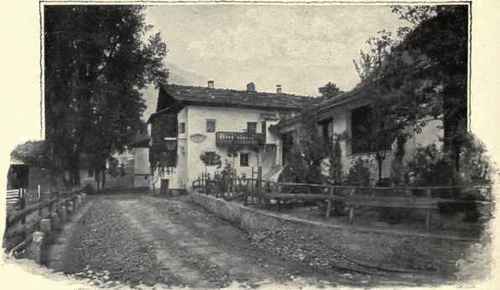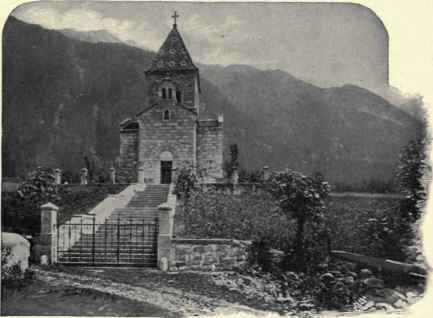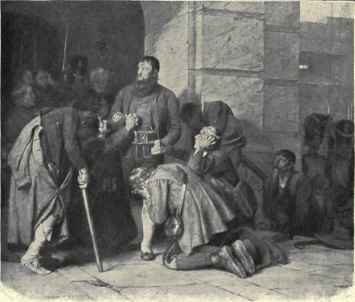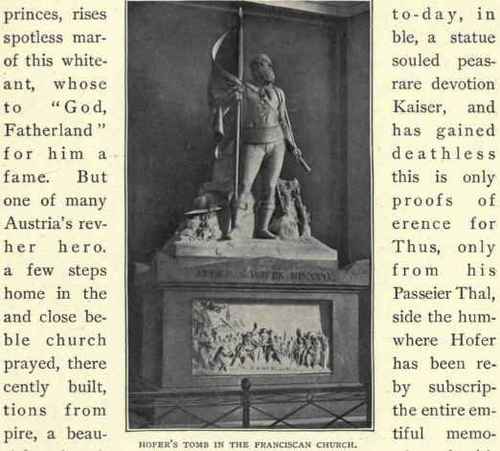South Tyrol. Part 15
Description
This section is from the book "South Tyrol - John L. Stoddard's Lectures", by John L. Stoddard. Also available from Amazon: John L. Stoddard's Lectures 13 Volume Set.
South Tyrol. Part 15

Andreas Hofer's Home.
Even the printed record of such a life and death is thrilling; but how much more do they impress us, when, after driving through his native valley, we see the modest house in which he lived as child and man ! It is still used as a wayside inn, and its rooms are practically unaltered; while the surrounding mountains wear for us the same calm majesty which clothed them, when he left their snow-clad slopes to give his life for Tyrolese freedom. I looked with mournful interest at many of his personal relics, particularly his hat, threadbare from usage in the field, and pierced with several bullet-holes. But that which touched me most was his last letter, written at Mantua four hours before his death. Among its closing lines are these pathetic words:
"Adieu, base world! Death seems to me so easy, that my eyes are not moistened by a tear." In fact, for this brave, simple-hearted man life could have had no more illusions. As he sat, quietly awaiting the inevitable summons, his whole career must have seemed to him a failure. He had fought strenuously, and had gained great victories, but how had they benefited either himself or the Tyrol? He had repeatedly called his countrymen to conflict, but the result of their self-sacrificing efforts had been the second subjugation of their land, whose soil had meantime drunk the blood of thousands of its children. He had toiled only for the good of his compatriots, yet one of them had betrayed him, - and for money! He had lost home, wife, children, and now life itself, to wrest his country from the domination of Napoleon, and to restore it to the Austrian emperor; yet, at the very moment when French soldiers were to shoot him, the bells were ringing in Vienna to announce the coming marriage of that emperor's daughter, Marie Louise, with his conqueror, Napoleon!

New Memorial Chapel, Near Hofer's House.
Truly to Andreas Hofer, at that hour, evil must have seemed triumphant. There is something terrible in the sight of such a man, compelled to face the shadow of approaching death, with nothing but a consciousness of rectitude to counteract his sickening sense of personal failure, man's ingratitude, and God's injustice. Sublime indeed must that soul be, which can at such a time look forward confidently to his vindication at the bar of history. In Andreas Hofer's case the vindication came with startling promptness. The marriage bells of Bonaparte were in reality sounding the knell of his stupendous empire. The Tyr5l soon became again incorporated with Austria. The traitor Riffl is now execrated as the Tyrolese Iscariot; and the brave martyr of Mantua is the ideal hero of his fatherland.
The Austrian kaiser showed his appreciation of his faithful subject by conferring a handsome pension on his widow, and raising his family to the ranks of the nobility. Moreover, in 1823, the patriot's body was brought back to the Tyrol, and buried with impressive ceremonies in the Franciscan church in Innsbruck, only a few feet distant from the splendid tomb of Maximilian I. There, near the figures of illustrious warriors and rial chapel, adorned with paintings eloquent of his unselfish loyalty and fearless death. Moreover, in the summer of 1893, there was erected on the hill above Innsbruck, called Berg Isel, an imposing bronze statue of the popular leader, marking the spot where he and his companions steadfastly withstood the onslaughts of the enemy, and from which, upon three occasions, he led his mountaineers to as many brilliant victories.

Hofer Led To Execution.

But that which specially recalls the memory of Hofer to the greatest number of his countrymen, and will perhaps prove more enduring even than bronze, is the portrayal of his life by means of popular plays, of which he is the hero. At Meran, for example, there has been constructed, on a broad meadow, near the town, an open-air theatre, similar to that of Oberam-mergau, the stage of which represents a village street, before a characteristic peasant's house with pretty wooden galleries and gables. Here, in the spring and autumn, a company of actors chosen from the people performs with admirable skill and genuine enthusiasm two dramas, written by Herr Carl Wolf, a citizen of Meran, which treat of the glorious days of 1809, as dear to Tyrolese hearts as are those of 1776 to Americans. These plays, which are entitled "Andreas Hofer" and "Tyrolese Heroes," produce a profound impression not only on the peasants who behold them, but also on the strangers, who attend them in large numbers. So many are the performers, so lifelike are their tableaux, so passionate is at times their acting, and, above all, so realistic are the movements of the crowds, lit only by the sun and shadowed merely by the passing clouds, that even a foreigner is deeply moved, as he reflects that many of these actors are the grandchildren of the patriots whose deeds they thus commemorate, and that they wear, in many instances, the very clothes which those defenders of their country wore, still kept as priceless heirlooms in their families. Meanwhile, above the background of the rustic stage, tower the same eternal mountains which they saw and loved, their bright green slopes flecked now, as then, with herdsmen's huts and white-walled homes for which the heroes fought and died. At any moment during the performance we have but to lift our eyes, to see, commanding the entire valley, like the presiding genius of the place, the stately form of Schloss Tyrōl; and during the representation of the battle we watch the puffs of smoke spring out from the steep mountain sides, and hear the roll of musketry, just as it echoed over the town when the real strife was raging, and when at last the French were beaten back to the precipitous cliffs, over whose brink the mountaineers drove them to their doom.
Continue to:


